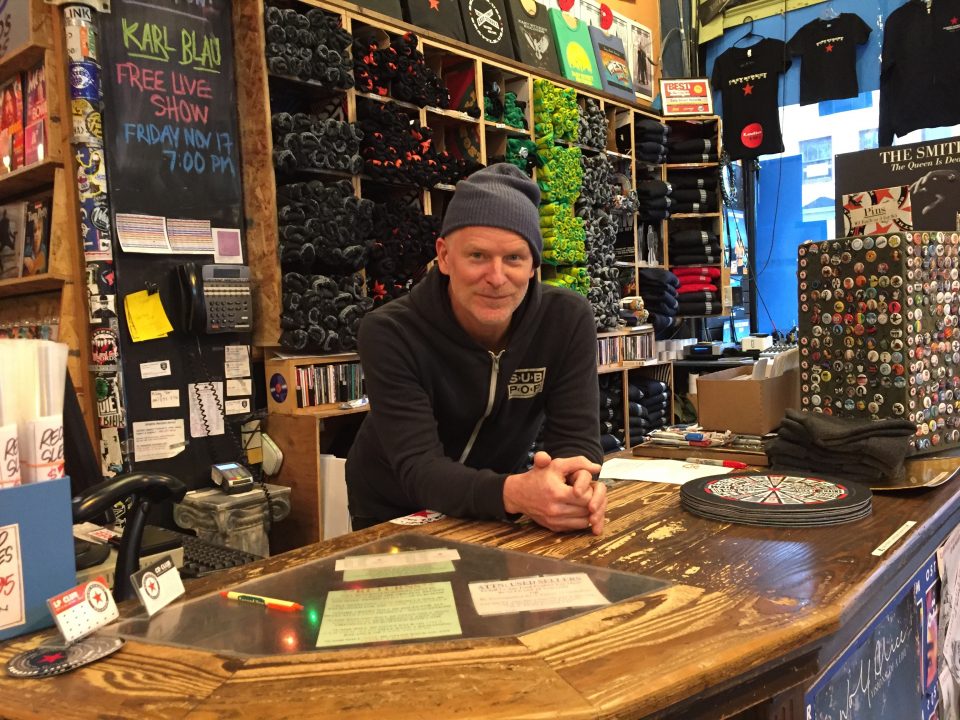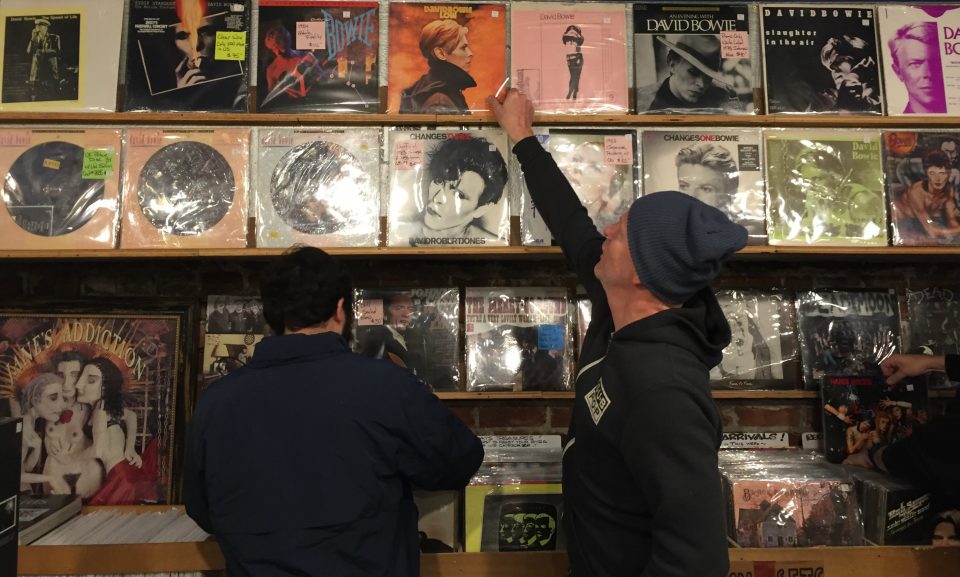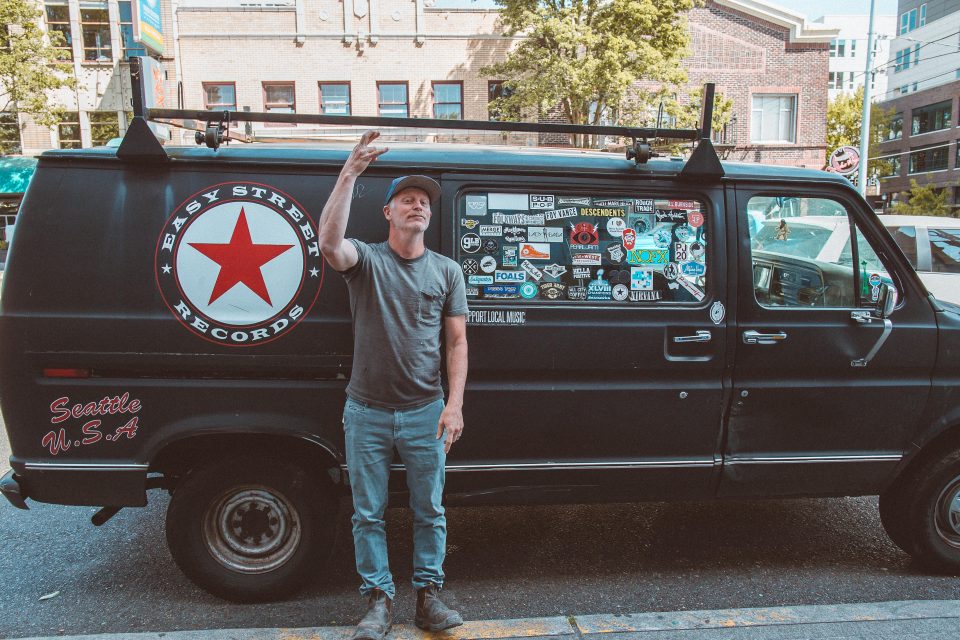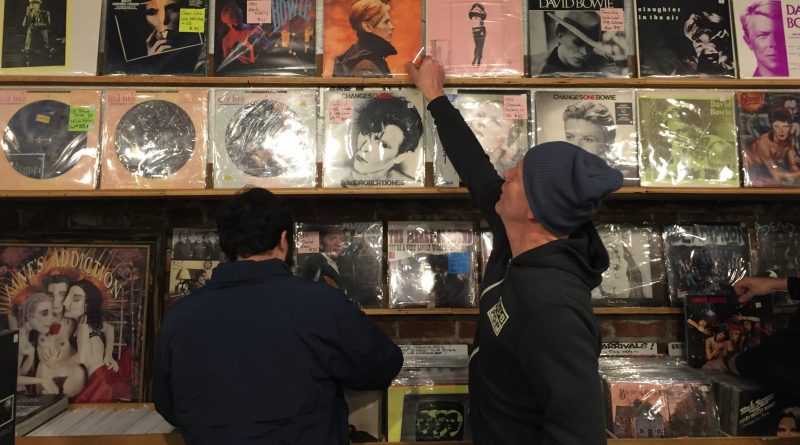Thank Easy Street Records’ Matt Vaughan When You Spin the Black Circle

That’s right, if you’ve purchased a vinyl record in the last 10 years—whether you picked it up in Seattle or Antwerp or Kyoto—you have a small group of independent record shops and their owners, including native Seattleite Matt Vaughan, to thank for its existence.
The owner of local indie institution Easy Street Records was a vinyl advocate even as a teenager, thanks to his music promoter mother and step-dad who collected the format. In 1987, he was literally handed the ownership and keys to a struggling West Seattle record store, and soon realized he’d need to start selling some of his 3,000-album personal collection to help make ends meet. It was a learning experience for the self-described “catch-and-release collector.” “I had no idea what I was getting into,” Vaughan said, speaking with me in the memorabilia-packed basement office of his busy shop. “All the employees immediately quit.” He can laugh now, but trying to run a business at 19 wasn’t easy. “I put a bed in the back and would shower at a friend’s house. I dropped out of Seattle University and decided to make a go of it.”
His devotion soon paid off. After moving his shop to the Hamm Building at the corner of California Avenue SW and SW Alaska Street in 1989—where it still is, a protected Historical Landmark—business gained momentum. Timing and coincidence helped. “Sir Mix-a-Lot had become a platinum-selling artist, Sub Pop and other small labels had started to put records out, and there were a few local acts on their way up,” he remembered. The gratitude was clear on his gray-stubbled face—and via the Sub Pop logo on his black hoodie. “Many of ’em just happened to live in West Seattle.” That confluence, the early-’90s Seattle Sound explosion that followed, and Vaughan’s relationships with local artists spelled success for his shop and bliss for music fans. It was a golden era—but brief.
By the turn of the century, indie music shops were struggling. Low-cost corporate behemoths dominated music sales, and savvy web users found free and easy access to albums and individual tracks. Vaughan and his fellow shop owners had to find ways to stay relevant. “Big-boxes were killing us with their loss-leader [prices] and “exclusive bonus track” releases,” Vaughan said. “Itunes was new and sexy and getting exclusive content. Amazon was beating us up. [There was] peer-to-peer file sharing like Limewire and Napster. And there were still chain stores to compete with.”
Compounding the problem: vinyl record sales had fallen far behind that of their smaller, shinier siblings. The format had become a nostalgic niche offering championed by hip-hop artists, small repro labels, audiophile labels, jazz aficionados, and bands like the Beastie Boys and Pearl Jam, and … that’s about it. During those “doldrums of vinyl days,” even indie shops rallied behind the newer format, releasing exclusive one-off CDs in the early 2000s. By 2007, even Vaughan, who always believed in, and never stopped selling LPs (in his original shop or the Queen Anne branch, shuttered in 2013) thought vinyl manufacturing was nearing extinction. And its decline would be felt in his bottom line, as vinyl sales were significant.
But that was the year that he and a small group of independent store owners conceived Record Store Day—and a decade later, the landscape has completely changed. Case in point: you can buy Justin Bieber vinyl at Walmart.
Yes, vinyl is back. This year’s production and sales numbers will top 2016’s, a trend seven years strong. The format will likely bring in $1B in revenue in 2017, thanks to compelling releases in audiophile weights and an endless array of colors, exclusive pressings, and the outspoken support of acts like Jack White (who’s actually created a house record plant with Third Man Records) and Pearl Jam (which has its own label, Monkeywrench Records).
But ultimately, it’s thanks to Record Store Day that vinyl didn’t go the way of the 8-track.
The revival is reflected in the layout of Vaughan’s iconic store; the entire upper level is devoted to wax, and there are more LP bins on the main floor than there were two weeks ago. There’s also the small stage in the café, where on Record Store Day 2015, Easy Street’s owner orchestrated the ultimate love letter to vinyl by bringing in legendary 1960s garage rockers The Sonics (and some big-name special guests) to play a set. The following year, those songs were released as a Record Store Day exclusive, of course. (How the in-store came to be is a story in itself; Vaughan told it with an awed grin that matched my own.)
I sat in that basement with Vaughan a week ahead of Record Store Day’s Black Friday offshoot to talk with him about his role in its creation, the resulting phoenix-like rise of vinyl, and how he went from a kid with a record collection to a humble Seattle legend. The man’s passion for music and the people who make it—from his friends (and employees) in local bands to classic rockabilly artists to Midwest “deep-groove be-bop” players was palpable. In his words, even “common records” like Martin Denny’s Exotica, Kris Kristofferon’s Me and Bobby McGee, and Thin Lizzy’s Jailbreak represent something bigger and more fundamental: “It’s history, it’s life changing, it’s original.”
I was not entirely surprised to see Vaughan’s integrity on display, too. Before meeting with a thrilled customer purchasing David Bowie’s The Man Who Sold The World—the rare, infamous original 1971 British release, on which Bowie appears in drag—Vaughan said that he always hopes he’s selling that kind of record to “the right person.” “We try to stay clear of selling on ecommerce sites. We like seeing the customer’s face and being part of the experience, too.” Proof: he talked with the buyer for at least 15 minutes about the record and Bowie’s catalog. Both parties wore enthused smiles.
Vaughan’s passion and authenticity are the core reasons that Easy Street Records remains—despite West Seattle’s earnest existential overhaul—the graceful old soul of the neighborhood, and the city’s most storied music shop. As evidenced by the excuse-me aisles, popular Pearl Jam/Sub Pop corner mini-shop, and crowded café during my visit, it’s only getting better with age. Just like a record collection.

NWMS: Tell me some of the history behind Record Store Day.
MV: The seeds go back a little bit. I’m part of a coalition with other indie record stores (Coalition of Independent Music Stores) around the country. We get together every year, have confabs in a host city discussing the challenges and opportunities in the record industry, as well as nerd off to new music. In 2002, we created a distro network called Junketboy (now Think Indie). By having a large buying group, we were able to score some exclusive pieces and have a nationwide group of retailers to sell them to. Our first big score was a Weezer B-sides collection in 2002. We sold 25,000 CDs in one day. That release gave us some hope and got the attention of the industry. We then released an EP by up ‘n’ comers Kings of Leon; next it was new band My Morning Jacket. The catch: we guaranteed “no returns.” The label or band would get paid up front. If it didn’t sell, we were stuck with ’em. I think the bands liked that swashbuckling spirit and no-nonsense way of doing business. We decided we needed to share our playbook, to open our distro network to all indie stores. To help create a couple other coalitions and have a united front. Soon enough, we were the ire of the big-boxes and chain stores. They were really gonna hate us now. Enter Pearl Jam.
NWMS: Right. The storied 2005 Easy Street performance.
MV: [Guitarist Mike] McCready had always been very supportive of the shop. I had mentioned that I was going to be hosting a music convention (10-year anniversary of CIMS) with a bunch of record store folks and he said he wanted to sit in. He said, “I don’t know if our band would’ve gotten off the ground had record stores not been so supportive back then. We owe a lot to you guys.” I said, “Well, you might as well just surprise everyone and do a show at the shop, then.” He raised an eyebrow and gave an Eddie Haskell grin and then we schemed how to propose the idea to his manager.
I sent in a proposal to [manager] Kelly Curtis. As Kelly and I were meeting [at the Easy Street café], we see Eddie [Vedder] walk in. He goes over to the Sonic Youth section and starts playing air guitar. He looks over to us and yells, “Hey Kelly, this will do. Talk to ya later.” Kelly laughs and says, “You better keep this quiet. The show is going to be here.” He scratches his head and says, “How the hell did Eddie know I was going to be here?” To this day, it’s a bit of a conspiracy.
The band and I kept it secret. On April 29, 2005, I brought three busloads of record store nerds to our West Seattle shop for an after-hours party. I told them there would be free beer and a band. One of the guys sees a bunch of covered equipment, pulls up a sheet, and sees a Pearl Jam stencil on the cabinet. I see him spouting and running over to people. I ran upstairs where the PJ guys were hiding out and said, “Hey ho, let’s go.” A minute later, Pearl Jam was playing in Easy Street.
About a month later, Kelly said that [drummer] Matt Cameron said that was the best drum sound he’s ever had, and the band was considering releasing it exclusively through our Junketboy network. It’s one thing for a developing band to do that, but for the biggest American rock band, that was something entirely different. They had relationships with all these entities that we were battling against—big-boxes, iTunes, etc. It was clear they would be upsetting the apple cart. It put the industry on notice, and was a major inspiration to indie stores. When has a band of that size shown such loyalty to indies? It soon became the cool thing do to. Pearl Jam Live at Easy Street became Easy Street’s best-selling CD of all time, and CIMS and their fellow coalitions were now shaking up the industry. And the following year, Record Store Day was born.
NWMS: How did the concept come about?
MV: [Indie stores] had been getting pretty desperate. In many respects, we were still considered tastemakers, we were breaking new artists, but we were getting used up and spit out. The labels saw us more as a marketing strategy. We were making more on co-op advertising, listening station titles, price, and positioning programs than we were sometimes on the records they were releasing. Remember all those billboards and murals at the Queen Anne store that changed out every three months?
Eric Levin, who owns Criminal Records in Atlanta, is a comic book fan and collector and he loved what the comic book industry had created with Comic Book Day, where special-edition comic books were made available on one day across the country. So we discussed the notion of Record Store Day. Chris Brown from Bull Moose Records pushed the notion of making it predominantly vinyl. It wasn’t as widely accepted in our group as you’d imagine. [Even] I initially felt it was a risk. Lots of indie retailers had gotten out of the vinyl game completely and here we were talking about bringing it back.
[But we] still believed in the format, and for those of us with used bins, we could see there was still a very viable collector’s market, as well as a growing number of younger people picking up cheap records or savvy shoppers flipping records for a profit through eBay. Three guys from each respective coalition were chosen as co-chairs of Record Store Day and it remains that way to this day.
NWMS: Do you ever wonder who else, if anyone, could have brought vinyl back like you all did?
MV: Well, Pearl Jam were calling us all out, slapping us all, when vinyl was on its death bed. I mean, c’mon, writing a vinyl love song: “You’re my whole world, I’d rather you than her.” [1994’s “Spin The Black Circle”] Eddie’s basically singing I’ll take my vinyl over this bitch. I will say, however, I did buy some records off of him after he met Jill, his wife. Things can change a little. I get it. [laughs]
Also, keep in mind that guys like Pete Rock, Seattle’s DJ Supreme, the Beastie Boys, DJ Shadow, J Dilla, Madlib, and the Stones Throw gang were the stalwarts of true crate-digging. Nas, Pharrell, Seattle’s Jake One, Anderson Paak, Tyler the Creator…it continues on. Finding beats, resurrecting once-forgotten artists. And record collecting never waned. As record manufacturing became more sparse, collecting became more fierce. [And] once you get started, it is really hard to get off that train.
NWMS: Ironically, RSD has gotten so big that even some collectors could now see it as the antithesis of indie.
MV: That is a fair assessment, for sure. [But it’s] a celebration of music and brick-and-mortar retail. What we as retailers tapped into was that the bands, labels, and artists had become disenchanted with the lack of authenticity in the industry. It had become a milquetoast, saccharine, hideous business.
What we didn’t know was that Record Store day would remind music lovers and musicians just how fun and gratifying buying music and being involved could really be. There was [also] a monetary element that was unexpected. The days of hograils, ridiculous expense accounts, and payola are over. The true lifers survived and the new breed has poked new life into the game. RSD has saved jobs in the music industry. Bands have a sense of comfort knowing that there are better possibilities making a living than there were a few years ago.
NWMS: How involved are you with RSD logistics versus plans at the shop?
MV: I’m not as involved in the national/global rollout as I once was. In 2007-10, I was on the CIMS Board of Directors, but now it is pretty well-managed and has a life of its own. We also now have a voting/vetting committee. We pitch for some dream releases and vote on submissions that labels and managers send our way.
As for Easy Street, we’re fortunate that we have guys like Andy Nelson, Rod Moody, Lars Swenson, Kevin Larson, Max, and Atticus that are vinyl lovers and as excited for RSD as any customer. Our GM Adam Tutty is a machine, having it all ready to stock and display the night before. We look through the solicitations about a month before and come up with an order quantity for each title. Having two levels and the café, it makes for as easy a flow as you’ll find. No doubt there will be some butt-brushing, but that door-busting clusterfuck [of early years] doesn’t happen anymore. As [UCLA basketball legend] John Wooden would say, “Mistakes become opportunities.”
NWMS: RSD is a major event. I don’t know how you completely avoid mistakes and surprises.
MV: In 2013, we had a flood from above the store. It took out about $25K of product and the cleanup kept us going until the minute RSD started two days later. In 2015, prior to the Sonics playing at the shop, I could see we had a slew of folks taking over the front of the store and into the street. It hit me that this might be creating a bigger commotion than I needed right now. I called my friend at the King County Executive office and basically told him, “Lay off us tonight. We got lots of people in front of the store, but don’t worry, we have it handled.” He was skiing and could barely hear me. What he heard was, “We have problems. We got too many people here.” Before I knew it, we had two fire trucks in front of the store and [fire personnel] threatening to shut the whole thing down. Once they saw these guys in their 60s-70s walking to the stage, they let the show go on.
NWMS: How do you top the Sonics playing your shop?
MV: I can’t. People might think, C’mon dude, Jack White, A Tribe Called Quest, Eric Clapton, Daft Punk, QOTSA, U2, Jay Z, The Gorillaz… I get it, but for a Seattle-owned record shop to have the founders of garage rock, guys that Jimi Hendrix would go see as a kid, the predecessors to what would become the Seattle Sound… And to perform with guests from Pearl Jam, Soundgarden, Tacocat, Screaming Trees, Mudhoney, Calvin Johnson, Chris Ballew—all on our little stage? I mean, c’mon. It was NW rock at its finest and most legendary. The only way to have topped it is if I could’ve gotten ahold of Skerik in time to play sax. Also, Ann Wilson was interested in performing “The Witch,” but she was out of town.
NWMS: Clearly, the early struggles were worth it. But all your success probably doesn’t make the nixed expansion into the Corner Pocket space hurt any less.
MV: I had my own lost weekend over that. Ultimately, I’m not the building owner. If it would’ve been a case of losing out because more money was being offered from other suitors, I could’ve accepted that. We would have matched any offer, we had a purchase and sale agreement with the Corner Pocket for significantly more than what they eventually got, but we couldn’t get the landlord to assign the lease to us. The idea was pretty simple: We were going to create West Seattle’s version of Max’s Kansas City meets Café Wha meets the Village Vanguard. Combining that, the record shop, and our café, we would truly have a morning, noon, and night experience. It’s pretty clear West Seattle was supportive, but I couldn’t persuade the owners of that. I think they were thinking it was gonna be a punk-rock club and they just couldn’t shake that idea out of their heads. So, yeah … it remains something of a mystery.
NWMS: It’s tempting to see it somehow as a byproduct of all the changes and construction and face-lifting happening in West Seattle these days.
MV: I understand the fear some people have with so many buildings coming down and all these newbies on our streets, but it’s my opinion that some of those buildings needed to go. The Southwest Historical Society and the Seattle Preservation Board have been incredibly active in preserving the charm and history of West Seattle, including the [Hamm Building] we are in. Also, the Junction Association and local Chamber of Commerce are exceptional at what they do. Small-town politics have saved West Seattle and allowed it to prosper while still maintaining a sense of self-identity. It’s still Mayberry Street to me.
NWMS: It wouldn’t be Mayberry Street without Easy Street. What do you think the shop looks like, and what your role looks like, in 10 years or more?
MV: Probably fewer CDs. [laughs; long, contemplative pause] Predictability leads to failure. To commit to something great, you must commit all the way. I’m still committed for the long haul.
Visit Easy Street Records this Friday—early, if you want a good shot at Record Store Day Black Friday rarities—to see Matt Vaughan and his friendly crew serving up the format he himself helped revive.


